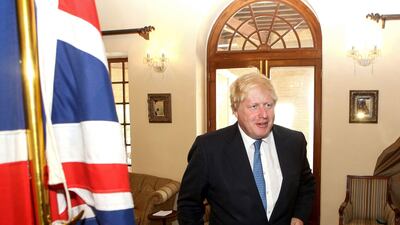Britain’s foreign minister discussed the Gulf crisis with his Kuwaiti counterpart on Saturday as international efforts intensify to find a resolution.
Boris Johnson “expressed anxiety regarding the continuing crisis in the region as he called on all sides involved to contain the stalemate and hastily resolve the matter through dialogue”, according to Kuwait’s state news agency, KUNA. “He also reiterated Britain’s support of Kuwaiti mediation efforts,” while Kuwaiti foreign minister Sheikh Sabah Al Hamad Al Sabah “applauded Britain’s support of Kuwaiti efforts”.
A day before his trip to Kuwait, Mr Johnson met in Riyadh with Sheikh Mohammed bin Zayed, Crown Prince of Abu Dhabi and Deputy Supreme Commander of the Armed Forces, and the Saudi Crown Prince, Mohammed bin Salman.
Saudi Arabia and the UAE, along with Bahrain and Egypt, have called on Qatar to adopt measures to ease the crisis, after they condemned Doha's rejection of the demands that Kuwait’s emir Sheikh Sabah had delivered to Qatar’s emir on June 22. The quartet, which is isolating Qatar through a travel and commerce ban and accuses it of supporting extremism, have said they are now considering what additional measures to take to pressure Doha.
But Qatar and the four countries are all strategic energy and security partners for the US, UK, Germany, China, Russia and other powers, and the western countries have been leading supporters of Kuwait’s shuttle mediation role.
Washington has increased its efforts to ease the crisis, with president Donald Trump aligning more closely with his state and defence departments, which have called for a resolution.
The US defence secretary James Mattis, who is close with Saudi, Emirati and Qatari leaders from his time leading US Central Command, spoke with Qatar’s defence minister on Thursday and “affirmed the strategic security partnership”, according to a Pentagon statement. The Centcom forward base and 11,000 US troops are located in Qatar.
Mr Johnson’s regional tour comes a week after a similar visit by the German foreign minister Sigmar Gabriel and two days before US secretary of state Rex Tillerson visits Kuwait for talks. Berlin has talked with Doha about German intelligence conducting monitoring of Qatar’s financial counter-terrorism initiatives and sources have said similar agreements with Washington are under discussion.
Arab Quartet officials, however, insist that despite the outreach of foreign powers, the solution to the crisis lies in Riyadh. Dr Anwar Gargash, the UAE Minister of State for Foreign Affairs, said on Friday that the solution to the crisis is "neither in London nor in New York, but in Riyadh".
A US state department spokeswoman said also on Friday that Washington expects the crisis to continue for weeks or months and “could possibly even intensify”.
Sameh Shoukry, the Egyptian foreign minister, blamed Qatar for causing human suffering in Syria and Libya. He said Doha's support of radical groups reinforced a wider network of extremism responsible for violence in Egypt and Europe.
"We see the level of damage and the level of human suffering that has been associated to interventions like Qatar in Syria and Libya and the heavy price that Egypt has to pay in the loss of civilian life," Mr Shoukry said in an interview with CNN broadcast on Friday.
The quartet said after a meeting in Cairo last week to discuss Qatar’s response to their demands that they would meet at an unspecified date in Bahrain and decide on their next steps. Further economic sanctions and a formal or informal expulsion of Qatar from the GCC have been referred to as possible areas of isolation.
On Saturday, the Arab Women Foundation announced that it had withdrawn the nomination of the powerful mother of the emir of Qatar, Sheikha Mozah, for the foundation’s First Arab Ms award, according to WAM news agency. The Dubai-based foundation’s board will also “delete all references to her in all communications”, due to “definitive evidence” that Doha supports terrorists, WAM reported.

